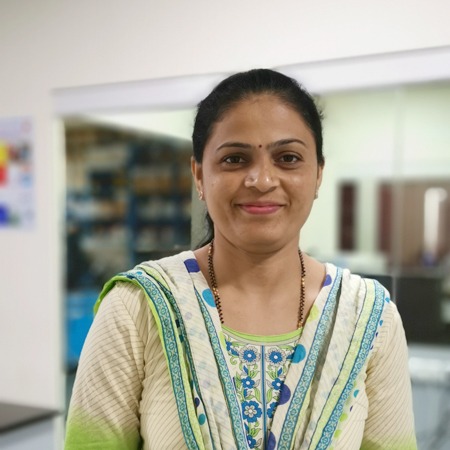
Dr. Shobha D.
Assistant Professor
-
Plant molecular biology
-
MSc: Biotechnology
-
shobhabiotech82@gmail.com
Dr. Shobha D., obtained her Ph.D. from Directorate of Cashew Research (ICAR), Puttur and Dept. of Applied Botany, Mangalore University. As part of her thesis work, she worked mainly on DNA based molecular markers especially RAPD, ISSR and microsatellite markers. She has been working on plant molecular biology for 10 years and successfully switched her research career from plant molecular biology to biomedical field. During her Post-Doctoral experience, she worked on biogenesis and structural characterization of surface macromolecules of Helicobacter pylori for translational medical applications. Currently she is involved in the development of biomarkers and identification of novel therapeutic targets in cancer using traditional medicines as surrogate using quantitative phosphoproteomic and metabolomic approaches. She is also actively involved in development of database of human signaling pathways – NetPath (http://www.netpath.org).
Experience
- Worked as post-doctoral fellow (2 years) at Yenepoya Research Centre, Yenepoya (Deemed to be University) Deralakatte, Mangalore. I was involved in the identification of novel therapeutic targets and biomarkers in various diseases including kidney related diseases
- Worked as ‘Post Doc Researcher’ in Medical Microbiology Department, Faculty of Medicine, University of Malaya, Kuala Lumpur, Malaysia under the projects on Helicobacter pylori
Awards / Honors
- Post Doctoral Fellow, Center for Systems Biology and Molecular Medicine, Mangalore, India, 2017
- Post Doctoral Fellowship, Department of Medical Microbiology, Faculty of Medicine, University of Malaya, Kuala Lumpur, Malaysia, 2014-2016
- Senior Research Fellow, CPCRI (ICAR), Regional Station, Vittal, 2011-2014
- Junior Research Fellow, DCR (ICAR), Puttur, 2006-2011
Research Interest/Area
Cancer biology, Proteomics and metabolomics, Human signaling pathways and Molecular targets of traditional medicines
Research
Dr. Shobha is currently involved in the identification of novel therapeutic targets and development of kinase inhibitors in human diseases including cancer using traditional medicines as surrogate by applying omics approaches for the better management of diseases. She is also involved in curation of molecular reactions associated with some important receptors and its ligands from publicly available literature to construct pathway map. It will help to wider scientific community to readily access data and contribute further to this signaling pathway. She is involved in characterizing the metabolites present in the traditional medicines using global metabolomics, which will provide platform to identify new biological active principles.
Publications Full List : ![]()
- Chandrasekaran J, Saptami Kanekar, Dagamajalu S, Prashanth Modi, Kirthika Gopinathan, Rajesh Raju, TS Keshav Prasad, Rex Devasahayam Arokia Balaya (2023). Computational design of Checkpoint Kinase-1 (CHK-1) inhibitors for cancer therapy. Research square. DOI: https://doi.org/10.21203/rs.3.rs-2414645/v1
- Mol P, Balaya RDA, Dagamajalu S*, Babu S, Chandrasekaran P, Raghavan R, Suresh S, Ravishankara N, Raju AH, Nair B, Modi PK, Mahadevan A, Prasad TSK, Raju R (2023). A network map of GDNF/RET signaling pathway in physiological and pathological conditions. J Cell Commun Signal. doi: 10.1007/s12079-023-00726-1
- Suchitha GP, Balaya RDA, Raju R, Keshava Prasad TS, Dagamajalu S* (2023). A network map of cytoskeleton-associated protein 4 (CKAP4) mediated signaling pathway in cancer. J Cell Commun Signal. doi: 10.1007/s12079-023-00739-w
- Najar MA, Aravind A, Dagamajalu S, Sidransky D, Ashktorab H, Smoot DT, Gowda H, Prasad TSK, Modi PK, Chatterjee A. Hyperactivation of MEK/ERK pathway by Ca2+ /calmodulin-dependent protein kinase kinase 2 promotes cellular proliferation by activating cyclin-dependent kinases and minichromosome maintenance protein in gastric cancer cells. Mol Carcinog. 2021 Nov;60(11):769-783.
- Rex DAB, Suchitha GP, Palollathil A, Kanichery A, Prasad TSK*, Dagamajalu S*. The network map of urotensin-II mediated signaling pathway in physiological and pathological conditions. J Cell Commun Signal. 2022 Feb 16. doi: 10.1007/s12079-022-00672-4.
Number of prejects: 12
